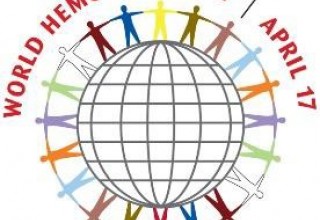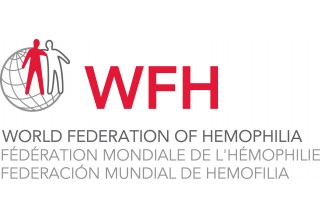World Hemophilia Day 2019

MONTREAL, April 15, 2019 (Newswire.com) - On April 17, 2019, the global bleeding disorders community and the World Federation of Hemophilia (WFH) will come together to celebrate World Hemophilia Day. World Hemophilia Day is an opportunity to help people with bleeding disorders live healthier, longer and more productive lives by educating and empowering them through knowledge sharing, information exchanges, education and training.
This year, the theme of World Hemophilia Day is outreach and identification, and our tagline is "Reaching Out: The First Step to Care." Patient outreach and identification is about finding and supporting individuals with hemophilia or other bleeding disorders—including von Willebrand disease—who have not yet been diagnosed or whose health needs are not being met by health care services. These patients can be found through awareness-raising campaigns and educational activities.
"Taking care of existing patients with a bleeding disorder is critically important. But we also have to look at those people who are suffering and haven't been diagnosed. We have to find these individuals, bring them into the community and provide them with the support they deserve."
—Alain Weill, President of the WFH
World Hemophilia Day 2019 activities include a global campaign to light up landmarks around the world in red, as has been done successfully in the past. Members of the community, partners and national member organizations (NMOs) will come together so that local landmarks will "light it up red" on April 17. Many people will also light a red light in their home or office in an individual effort to raise awareness in their community. To access World Hemophilia Day resources, such as a downloadable poster and social media badges, visit www.wfh.org/en/whd.
WFH support for the bleeding disorders community is provided by many endeavors that are making a difference in the community today, including:
-
WFH programs, which are carried out in collaboration with national member organizations (NMOs) and a dedicated group of medical and lay volunteers and are based on a comprehensive development model that aims to achieve sustainable comprehensive care and "Treatment for All."
- The WFH Humanitarian Aid Program, which provides a range of integrated care development training programs to ensure the local infrastructure and medical expertise in developed countries are able to use donated products in the most optimal way possible.
- The Global Alliance for Progress (GAP) Program is the WFH flagship development program aimed at closing the gap in treatment between developed and developing countries in three key areas: the number of people born with hemophilia and those who reach adulthood; the estimated and actual number of people known with bleeding disorders; and the need versus the availability of treatment products.
- WFH World Bleeding Disorders Registry (WBDR), which uses data collection to advance the understanding and care of people with hemophilia worldwide. An accessible patient registry strengthens our capacity to identify, diagnose, treat and care for people living with hemophilia and other inherited bleeding disorders.
- The WFH Annual Global Survey, which collects basic demographic information and data on access to care and treatment products in order to provide hemophilia organizations, hemophilia treatment centers and health officials with useful information to support efforts to improve or sustain the care of people with bleeding disorders.
- The WFH eLearning Platform, which features more than 500 important educational resources for users with both medical and non-medical backgrounds—in six languages—including guides, fact sheets, videos, articles, games and interactive modules that are downloadable for free and are well-suited for any learning style or area of interest.
The WFH would like to thank our 2019 World Hemophilia Day sponsors for their continued support:
|
|
About hemophilia and other bleeding disorders
Hemophilia, von Willebrand disease, inherited platelet disorders and other factor deficiencies are lifelong bleeding disorders that prevent blood from clotting properly. People with bleeding disorders do not have enough of a particular clotting factor, a protein in blood that controls bleeding or else it does not work properly. The severity of a person's bleeding disorder usually depends on the amount of clotting factor that is missing or not functioning. People with hemophilia can experience uncontrolled bleeding that can result from a seemingly minor injury. Bleeding into joints and muscles causes severe pain and disability, while bleeding into major organs, such as the brain, can cause death.
About the World Federation of Hemophilia
For over 50 years, the World Federation of Hemophilia (WFH)—an international not-for-profit organization— has worked to improve the lives of people with hemophilia and other inherited bleeding disorders. Established in 1963, it is a global network of patient organizations in 140 countries and has official recognition from the World Health Organization. To find out more about the WFH, please visit www.wfh.org.
Media contact:
Neha Suchak, Director, Marketing and Communications Tel.: +1 514-875-7944, #2857 nsuchak@wfh.org
Source: World Federation of Hemophilia

